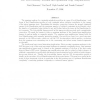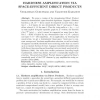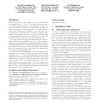5 search results - page 1 / 1 » The PCP theorem by gap amplification |
137
click to vote
STOC
2006
ACM
16 years 2 months ago
2006
ACM
The PCP theorem [3, 2] says that every language in NP has a witness format that can be checked probabilistically by reading only a constant number of bits from the proof. The cele...
123
click to vote
STOC
2009
ACM
16 years 2 months ago
2009
ACM
The quantum analog of a constraint satisfaction problem is a sum of local Hamiltonians - each (term of the) Hamiltonian specifies a local constraint whose violation contributes to...
118
click to vote
CC
2008
Springer
15 years 1 months ago
2008
Springer
We prove a version of the derandomized Direct Product lemma for deterministic space-bounded algorithms. Suppose a Boolean function g : {0, 1}n {0, 1} cannot be computed on more th...
123
click to vote
STOC
2009
ACM
16 years 2 months ago
2009
ACM
The "direct product code" of a function f gives its values on all k-tuples (f(x1), . . . , f(xk)). This basic construct underlies "hardness amplification" in c...
164
click to vote
CORR
2007
Springer
15 years 1 months ago
2007
Springer
An instance of the maximum constraint satisfaction problem (Max CSP) is a
nite collection of constraints on a set of variables, and the goal is to assign values to the variables ...



